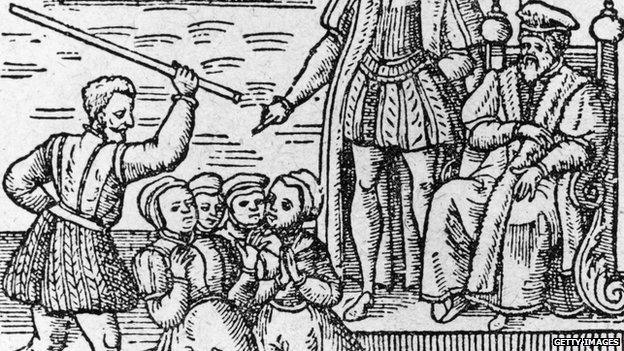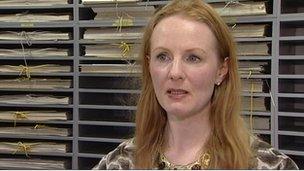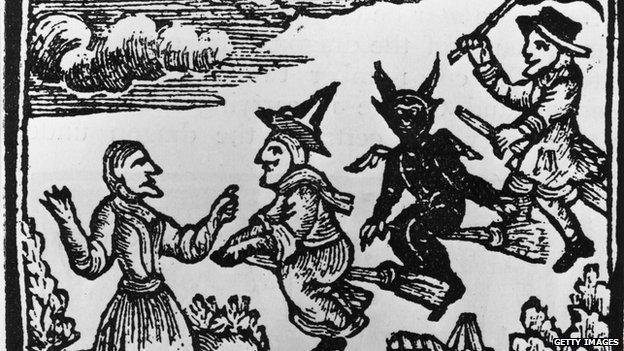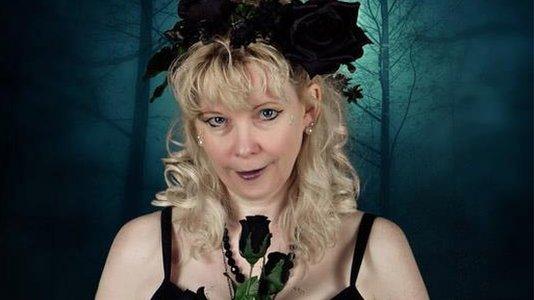Witches of Islandmagee: Toil and trouble over memorial plans
- Published

If a person was convicted of witchcraft they could serve jail time, be put in the stocks or even face the death penalty
The year is 1711. Eight women - including four from Islandmagee, County Antrim - are found guilty of witchcraft at Carrickfergus courthouse.
A young girl new to the area, Mary Dunbar, has accused the women of bewitching and tormenting her, culminating in a dramatic trial.
The women, who would become known as the Islandmagee witches, are all sentenced to a year in jail and forced to do time in the public stocks - a narrow escape from the death sentence.
It would be the last witchcraft trial to take place across the island of Ireland.
And despite happening more than 300 years ago, the story of the Islandmagee witches is still stirring up trouble.
'Miscarriage of justice'
It has even been dubbed the Irish real-life version of The Crucible, external, US playwright Arthur Miller's story about witchcraft and persecution, and remains controversial because of new proposals to erect a memorial to the women.

Martina Devlin said she would like to see the women receive a posthumous pardon
Irish author and journalist Martina Devlin told BBC Radio Foyle she felt the women had been unfairly persecuted for centuries and deserved a posthumous pardon.
"Clearly the women were victims of a miscarriage of justice, there is nothing we regard as actual evidence against them," she said.
"The conviction still stands against these women. Even in the Salem witch trials, some of those who were convicted were given a posthumous pardon.
"I feel the women of Islandmagee deserve their good name to be restored to them."
'Anti-God'
She asked Larne Borough Council to consider putting up a plaque and plants at the new Gobbins visitor centre in Islandmagee.
However, not everyone on the council was supportive of the plan.
Speaking to the Larne Times, external, TUV councillor Jack McKee described the proposal as "anti-God" and said he could not support it, over worries that the plaque would become a "shrine to paganism".
Ulster University lecturer, Dr Andrew Sneddon, studies the history of witchcraft in Ireland, and takes a different perspective on the memorial.
"From a modern perspective we might see the conviction as unjust, but from a historical point of view, there was nothing unjust about [the trial]. The women were tried under a law, according to due legal process and convicted by a jury," he said.
'Romanticising the past'
Dr Sneddon said the women had been convicted of "harming by magical means" under the 1586 Witchcraft Act, and at the trial they were not convicted of dealing with the devil, even although that is what Mary Dunbar accused them of.
Some Church of Ireland and Presbyterian clergymen at the time doubted whether the convicted witches were witches at all.
"These women were targeted, and the case certainly became a cause célèbre, at a time when other cases weren't picked up, partially because of the political and religious turmoil in County Antrim at that time," he said.

Hundreds of witch trials took place across Europe during the 15th-18th centuries
But he also said any memorial to the women should be placed at the old courthouse in Carrickfergus, not in Islandmagee.
"Not all the Islandmagee witches were from Islandmagee, but all the suspects were tried in Carrickfergus," he said.
"We should mark the last witchcraft trial on the island of Ireland, but must be careful not to impose our modern interpretation on the past or romanticise it."
Martina Devlin said she believed the plaque was a "humane gesture" to the women and a way of remembering their story - but she would like to see more done eventually.
She said: "The important thing is that Larne Borough Council have been very open to the idea.
"The women deserve a lot more than a plaque, but that's a good start."
- Published20 August 2012
